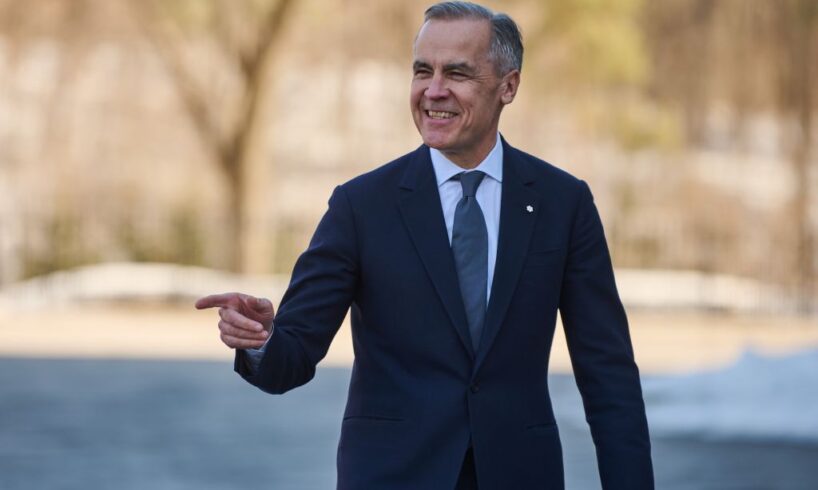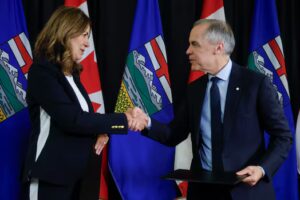
Prime Minister Mark Carney’s first 100 days after winning the federal election were flooded with natural resource lobbyists, from oil refiners and pipeline operators to a mining giant and steel producers, data analysis shows. Environmental groups say they couldn’t get a word in.
The lobbying blitz coincided with Carney’s government tabling Bill C-5 on June 6, his 39th day in office, following the spring election. The set of sweeping laws passed the House on June 20, his 53rd day in office following the election, allowing cabinet to fast-track major industrial projects by overriding key environmental and safety protections, in the “national interest” of Canadians.
Prominent environmental advocates say they concurrently struggled to secure any back-and-forth with the Prime Minister to discuss environment-related legislation, despite fossil fuel and mining executives being granted repeated access. They say the imbalance reflects a prioritization of industry voices by Carney during the drafting of Bill C-5, many of whom stand to benefit from expedited industrial projects, while sidelining organizations pushing for stronger environmental protections in the face of imminent climate change.
“There has been an unending parade of fossil fuel lobbyists in Ottawa, all getting meetings with various people, [including the] Prime Minister,” Environmental Defence executive director Tim Gray, said. “He is hearing disproportionately from the industries that represented the 20th century economy, not the 21st century economy … as the rest of the world electrifies and moves towards a cleaner economy.”
Just two days after winning the April 2025 federal election, Prime Minister Mark Carney met with lobbyists representing Suncor Energy, Inc. While lobbyists for almost two-dozen natural resource companies secured meetings with Carney in his first 100 days, environmental groups say they’ve been shut out. Photo: Carlos Osorio / The Narwhal
Using open data from the federal government’s registry of lobbyists, The Narwhal tracked every disclosed lobbying event, whether in person, over the phone, or in videoconference, with Carney between April 28 and Aug. 6, 2025 — his first 100 days in office after winning the federal election. (He was officially sworn in on March 14, after taking over leadership of the Liberal Party from former prime minister Justin Trudeau, but Parliament was dissolved soon after and the election triggered.)
Analysis of those records found that of the 44 organizations to have disclosed securing lobbying access with the new prime minister during that time, almost half, or 45 per cent, represented natural resource interests. Two days into his new mandate as prime minister, he had his first two disclosed lobbyist meetings, one with oil and gas producer Suncor, the other with pipeline operator and gas processor NorthRiver Midstream. During his first three-plus months, his office also met with steel manufacturer ArcelorMittal Dofasco and oil and gas industry groups like the Canadian Association of Petroleum Producers and Pathways Alliance, which is a collective of major oilsands producers.
An additional 13 per cent of meetings were with lobbyists representing the interests of automotive and other industrial organizations, including Volkswagen, Stellantis, the Canadian Vehicle Manufacturers’ Association and the Cement Association of Canada. The remaining 40 per cent of organizations Carney met with were a mix of unions, business associations and other private interest groups.
Previous reporting from The Narwhal found that oil and gas companies successfully secured lobbying access to the new Prime Minister in his early days, including at an in-person gathering, as they pushed for him to knock down key Trudeau-era environmental policies. Our analysis reveals the scale of that lobbying: in his first 100 days, Carney heard from representatives from the sector at a pace of roughly once every three days — though several of these instances occurred on the same day, and at the same meetings.
Duff Conacher, co-founder of Democracy Watch, an Ottawa non-profit focused on making Canadian governments and corporations more accountable, said the lobbying disclosures likely represent a fraction of what natural resource companies have actually undertaken in the first months since Carney took office.
“It’s really easy to lobby in secret when all you have to do is exploit one of a dozen loopholes [in the Lobbying Act],” Conacher said. He highlighted the absence of any requirement for lobbyists to disclose unpaid lobbying, written communications like emails or texts, casual conversations (as opposed to “arranged” communications), lobbying for tax credits or communications with regulatory agencies about the enforcement of laws that apply to one’s business.
The Narwhal’s analysis also does not include lobbying of senior government officials and cabinet ministers.
Environmental organizations unable to meet with Prime Minister Carney
The findings are very different for meetings between the prime minister and environmentalists, who say they have been unable to secure access. Analysis of federal lobbying records shows that of the 53 lobbying communications listed in the registry in Carney’s first 100 days, none appear to be with an environmental advocacy organization.
After reaching out to the prime minister, Gray said Carney’s staff told Environmental Defence he would not speak with them, but did not provide a rationale.
“The prime minister needs to hear what environmental organizations — which represent millions of Canadians — think about major projects and realignment of our economy,” Gray said.
The Prime Minister’s Office did not respond to questions from The Narwhal on natural resource lobbying and why access was not granted to environmental groups, including Environmental Defence.
Spokespeople from environmental advocacy groups Ecojustice, MiningWatch and Nature Canada told The Narwhal they had similar experiences: each reached out to the Prime Minister’s Office in his first 100 days to discuss either mandate letters, pending legislation or prescient environmental issues. None were granted access.
When Carney won the federal election, Nature Canada director of policy Akaash Maharaj said the conservation charity was initially optimistic about the new prime minister’s campaign commitments on nature protection. Then came some early cabinet announcements that Maharaj called confusing — in May, Carney bundled the portfolios of Parks Canada and Heritage Canada and created the new position of Secretary of State for Nature.
Maharaj said Nature Canada reached out to the Prime Minister’s Office multiple times, with Carney’s office acknowledging the charity’s emails but never extending an invitation to meet with him or his senior staff. Nature Canada representatives instead met with the Environment Minister and Secretary of State for Nature.
As natural resource industry representatives continued to gain access to the prime minister himself, Nature Canada doubled down: on Sept. 9, the charity penned an open letter with seven other conservation charities to Carney’s office and all Canadian premiers, stating that “tariff responses and nation-building projects cannot be accomplished at the expense of [Canada’s] natural heritage.” In that letter, the charities reiterated their interests in meeting with the prime minister. As of Oct. 7, Maharaj said Nature Canada has not received a reply about their request for a meeting with the prime minister.
Maharaj said the Prime Minister’s Office did confirm receipt of a Sept. 3, 2025, letter from Nature Canada and eight other national organizations including Ecojustice and Environmental Defence. That letter did not ask for a meeting, rather urging Ottawa to limit “national interest” designations under the Building Canada Act to projects that advance reconciliation, protect the environment and exclude fossil fuel development meant for export.
Nonetheless, Maharaj said the frequency of natural resource industry lobbying isn’t surprising. But he pointed out that this outsized industrial influence stands in contrast to the reality of Canada’s economy. Small- and medium-sized businesses employ more than three quarters of Canadians and, according to Statistics Canada, Canada’s natural resources sector made up just 3.4 per cent of all employee jobs in the country in 2023. Maharaj said prioritizing access to already wealthy and powerful institutions and forgoing environmental standards in the midst of Trump’s trade war is not in the interest of Canadians.
“Eventually the time of crisis will pass, but the effects of the decisions we make during this crisis will last for generations, especially for major national projects,” Maharaj said. “Canadians are right to say that during a time of economic anxiety, their focus has to be on the economic well-being of their family. But that is not incompatible with environmental standards, including standards that don’t exacerbate climate change.”
Updated on Oct. 16, 2025, at 11:48 a.m. ET: This story has been updated to correct a statement from a source that lobbying for tax cuts does not have to be registered and disclosed. Lobbying for tax cuts does have to be disclosed, while lobbying for tax credits does not.





